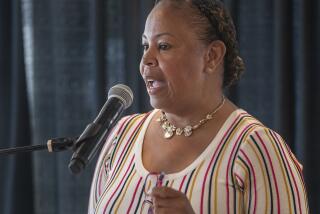Column: Would a citizens commission work in overseeing L.A.’s sheriff?
Momentum is building for the creation of a citizens commission to oversee the Los Angeles County Sheriff’s Department, where scandals led to the criminal convictions of deputies and to Sheriff Lee Baca’s resignation this year. Now, Supervisor Mark Ridley-Thomas has introduced a motion to create such an oversight body. The motion is scheduled for a vote in the next couple of weeks and, though it may fall short this time (more on that in a minute), some form of a citizens board seems likely to come to life by the end of the year.
What’s less clear is what such a panel would do, and whether it has any chance of fulfilling the expectations of some of its most ardent supporters.
Conceptually, a citizens commission to oversee law enforcement is an easy sell in Los Angeles. At the Los Angeles Police Department, the Police Commission is the agency’s policymaking body and acts as the department’s board of directors. It provides the mayor the list of candidates from which he can choose a police chief; it is then responsible for evaluating the chief’s performance and can even fire him. Though once limited by civil service rules that restricted its power over the chief, the Police Commission has had far more authority since voters expanded its power with a set of 1992 charter amendments that also capped a chief’s tenure at 10 years.
The Sheriff’s Department is different. Unlike the LAPD chief, the sheriff is an elected official and cannot be removed by any panel, nor is he bound by term limits. The result is a murky system of accountability that has frustrated efforts to improve the department for generations. The sheriff is directly accountable to the voters, but he has rarely faced a challenge, so he’s pretty much been able to do as he pleases.
Advocates of the citizens commission want to change that. As one flier urging support for the commission states: “We have the right to establish and maintain an independent process to monitor, investigate, discipline and to refer as needed for prosecution the conduct of deputies.”
Here’s the trouble: This commission, even if approved by the board, won’t have that kind of authority. It won’t be able to discipline deputies, it won’t be able to refer them for prosecution, and it may have trouble monitoring them. State law gives those responsibilities to the elected sheriff, and even a sheriff who uses that power poorly can’t be disciplined or removed by anyone but the voters.
The question, then, is whether a citizens commission could exercise sufficient informal authority that it would be an agent of reform even without the power that the Police Commission has. Ridley-Thomas believes it can.
“In government, there is nothing more powerful than sunshine,” the supervisor told me last week. “We are past due for this.”
Miriam Krinsky, who served as executive director of the influential Los Angeles County Citizens’ Commission on Jail Violence, agrees. The jail commission’s recommendations have helped propel a new urgency for reform of the department, and, as she noted to me last week, that commission had no formal legal authority — it merely highlighted problems and helped generate support for solving them. Moreover, she and other supporters of the oversight commission argue that the county’s newly created inspector general should report to the commission rather than the board, a move that would give the new panel an investigative arm.
All of which brings the matter back to politics. The board is split: Ridley-Thomas and Supervisor Gloria Molina have expressed support for the commission; supervisors Don Knabe and Mike Antonovich have indicated their opposition. (Jim McDonnell, leading candidate for sheriff, announced his support for the commission this month; Ridley-Thomas endorsed McDonnell a few days later.)
That leaves Supervisor Zev Yaroslavsky. When we spoke last week, he said he was still pondering the matter, but he’s clearly leaning against it. “I’m reluctant to create structures that have no power and no authority,” he said, adding that such a commission “will ultimately disappoint.”
That may be enough to scotch the idea for the moment, but perhaps not for long. Yaroslavsky is termed out, as is Molina. Molina’s replacement, Hilda Solis, has indicated she supports establishing a commission, so one supporter will arrive as another leaves. More important, the two challengers in a runoff for Yaroslavsky’s seat, former Santa Monica Mayor Bobby Shriver and former state legislator Sheila Kuehl, both told me last week that they too support a citizens commission. So even if Ridley-Thomas falls short this time, his third vote may well be on the way.
More to Read
A cure for the common opinion
Get thought-provoking perspectives with our weekly newsletter.
You may occasionally receive promotional content from the Los Angeles Times.











